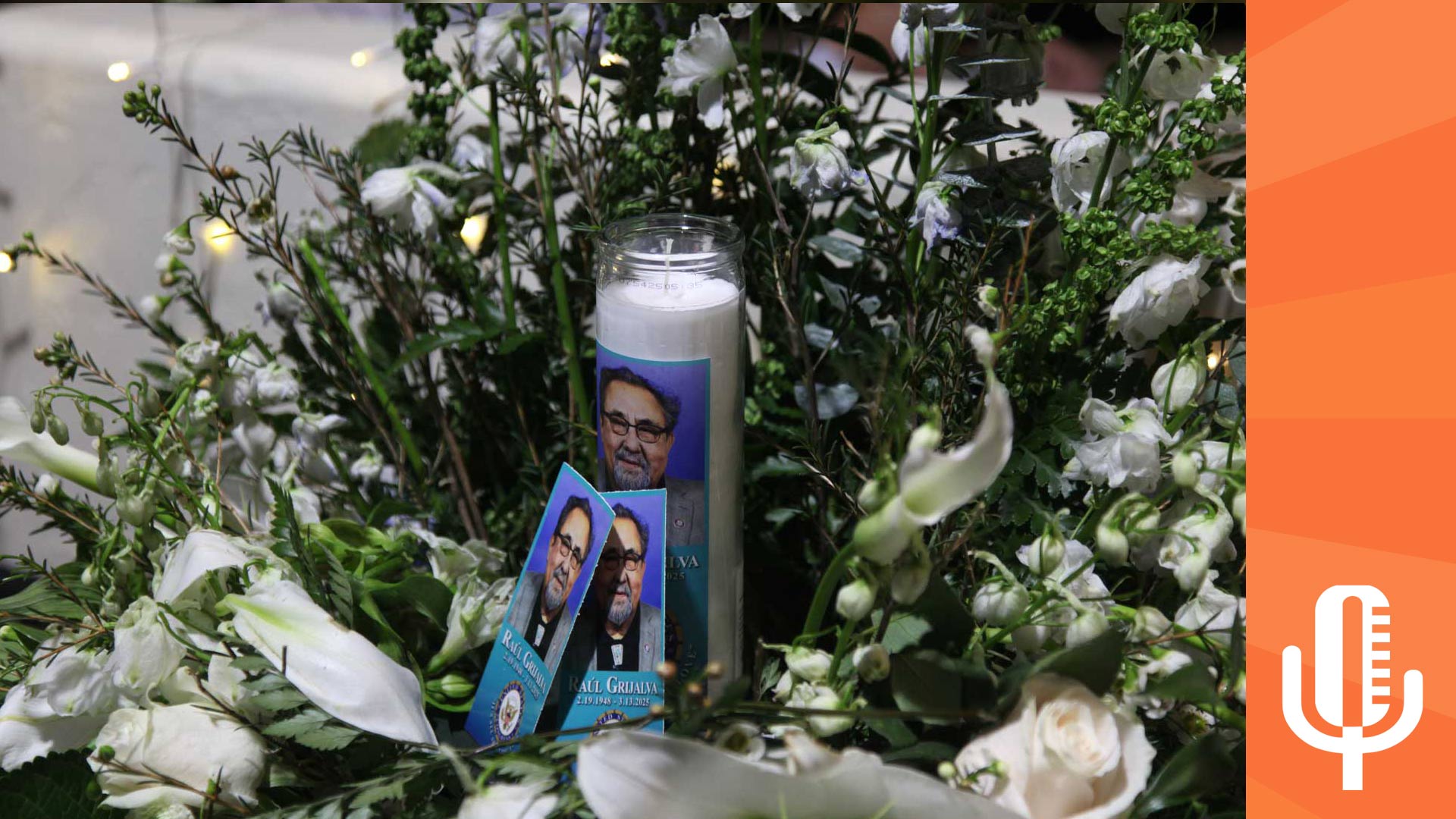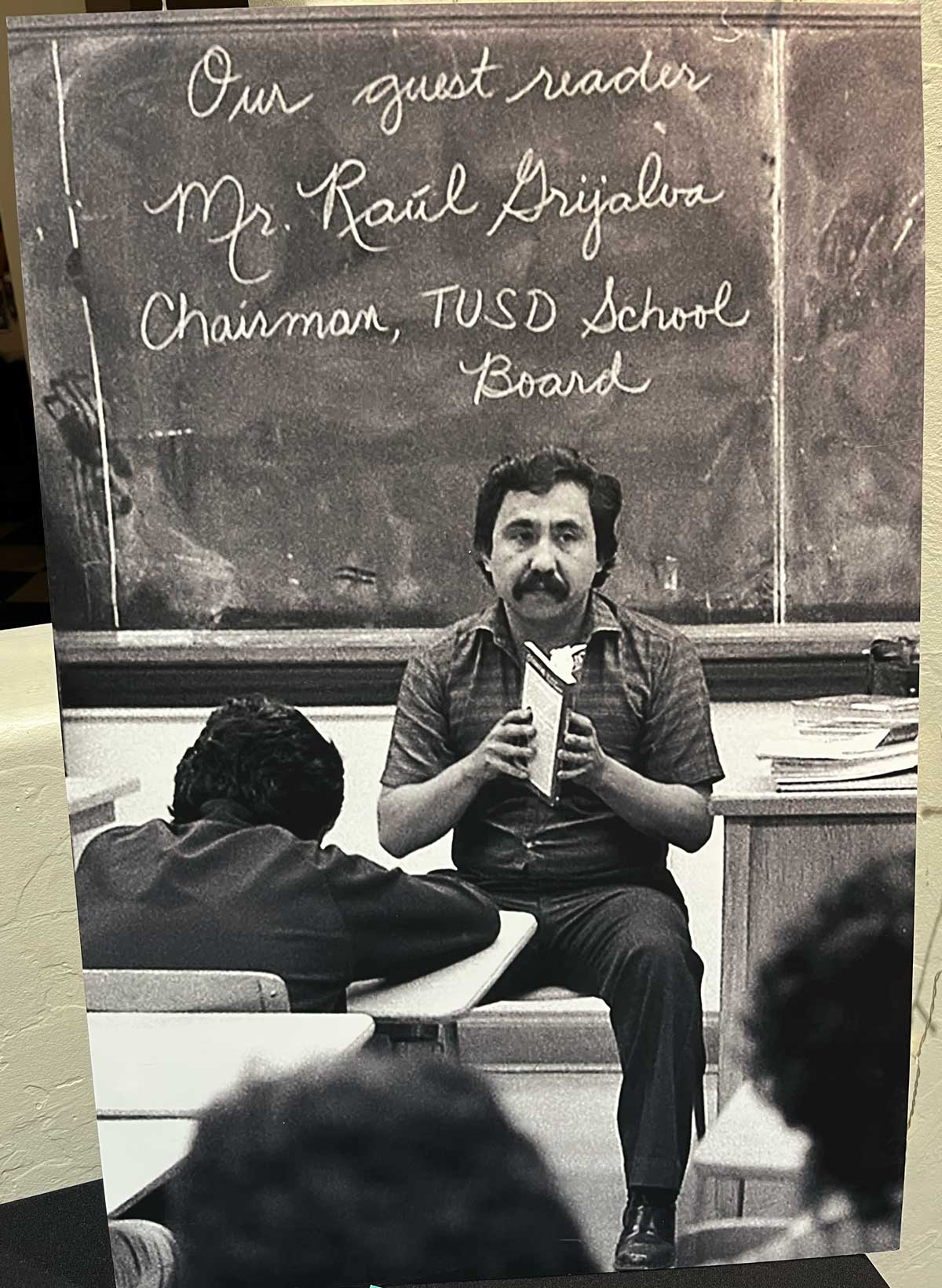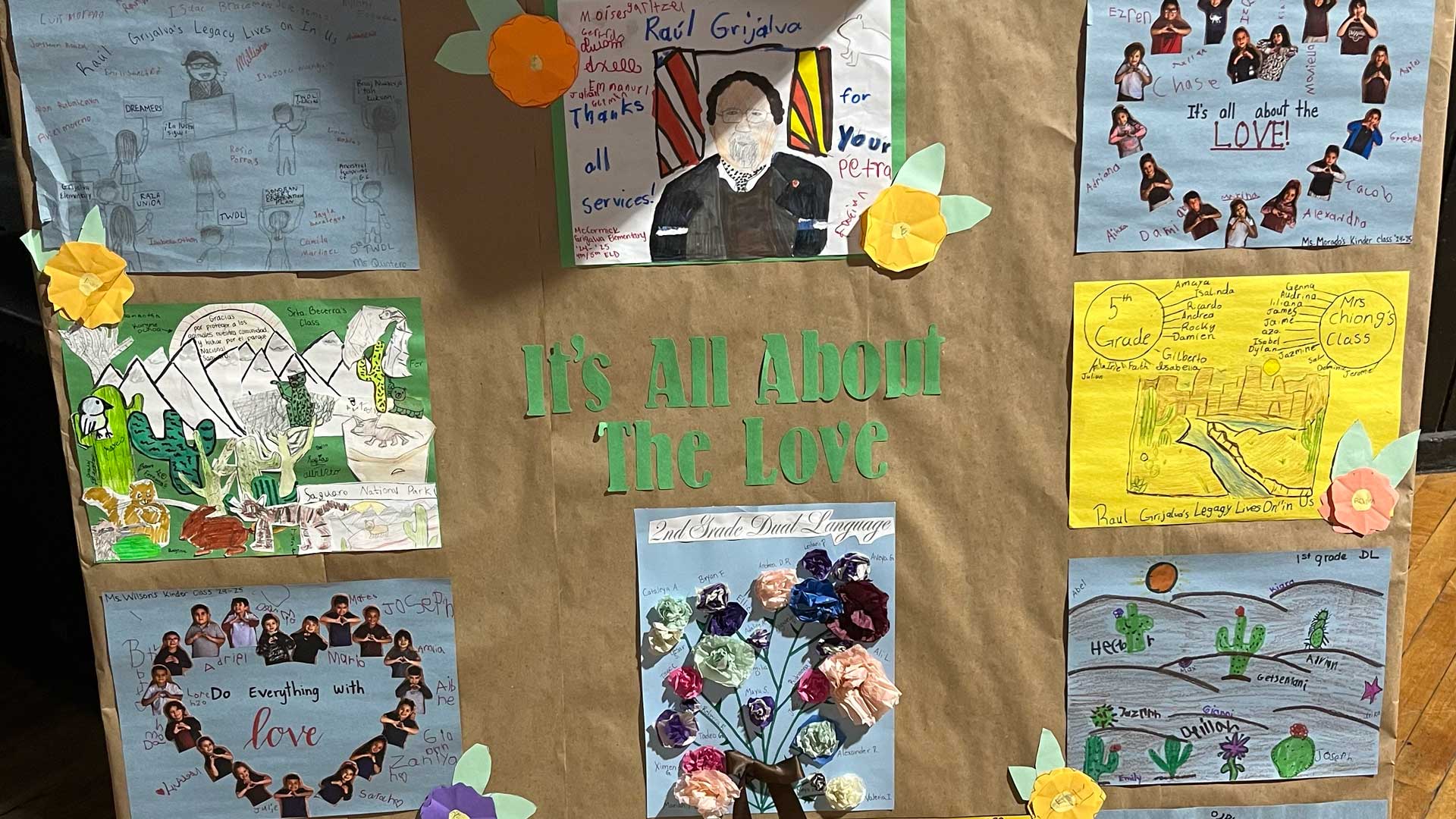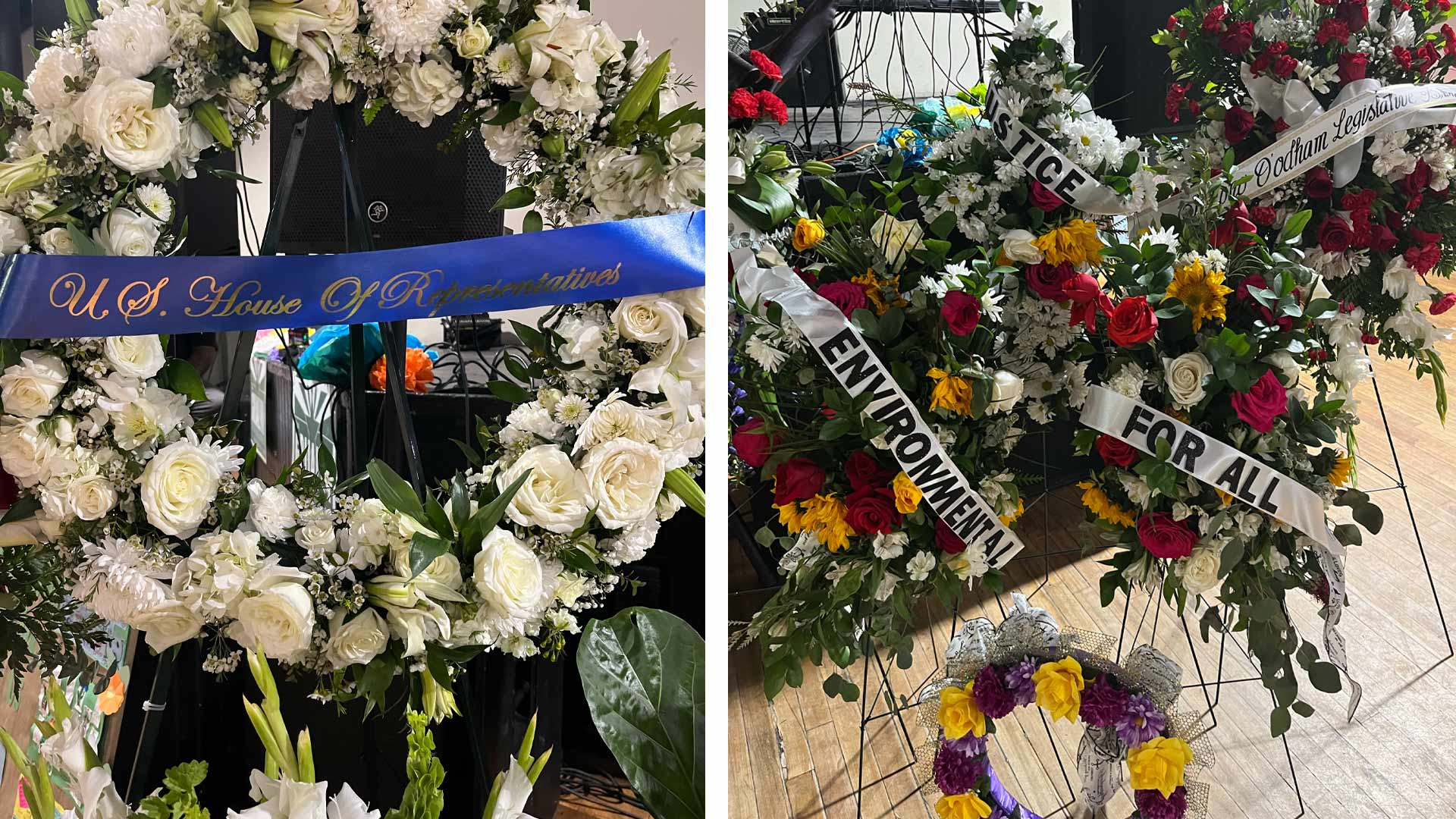 A memorial candle of former Congressman Raúl Grijalva sits in a display of flowers on Wednesday, March 26, 2025.
A memorial candle of former Congressman Raúl Grijalva sits in a display of flowers on Wednesday, March 26, 2025.
The Buzz for March 28, 2025

Southern Arizona's longtime Congressman Raúl Grijalva died earlier this month at the age of 77. Grijalva, a Democrat, was a towering figure in Arizona politics and was known for his steadfast advocacy for immigration, environmental, and tribal concerns in Congress.
“He was a lifelong activist, who happened to be a member of Congress,” Ruben Reyes, Grijalva’s long-time district director, said during the late congressman’s funeral. “His community loved him for it–for his unflinching, unwavering, unapologetic, happy-go-lucky style.”
 VIEW LARGER An image on display at his memorial service shows Raúl Grijalva reading to school children when he was chair of the Tucson Unified School District Board of Directors (1974-1986).
VIEW LARGER An image on display at his memorial service shows Raúl Grijalva reading to school children when he was chair of the Tucson Unified School District Board of Directors (1974-1986). A Sunnyside High School graduate, Grijalva grew up in the barrios of South Tucson, seeing firsthand the struggles of working-class families—an experience that shaped his lifelong commitment to social justice. A firm voice in political spaces, Grijalva took pride in being a blunt but honest leader for his district.
But his legacy extends far beyond Washington D.C.
Grijalva’s political journey began in 1972 with an unsuccessful campaign for the Tucson Unified School District board. But that didn’t stop him. After mellowing his hard left stance and stepping away from the Raza Unida Party–a former Hispanic political party centered on Chicano nationalism, Grijalva would eventually win a TUSD seat, then get elected to the Pima County Board of Supervisors. The halls of Congress were next, where he dominated progressive spaces for more than two decades.
 A board thanking Congressman Raúl Grijalva for his years of service and advocacy for education, made by Tucson-area students. March 26, 2026
A board thanking Congressman Raúl Grijalva for his years of service and advocacy for education, made by Tucson-area students. March 26, 2026
On Wednesday, close to one thousand mourners filled Tucson’s St. Augustine Cathedral to lay to rest the late congressman. Notable speakers included former House Speaker Nancy Pelosi, Congresswoman Alexandria Ocasio-Cortez, and former Interior Secretary Deb Haaland.
Reyes was one of the speakers at Grijalva’s funeral, where he recalled a special moment the two had driving down Interstate 8. With windows down, cigarette ashes flying back in the car, and playing air guitar to Bob Marley’s Three Little Birds, Grijalva would “scream through the wind and say, 'Don’t worry about a thing, everything’s going to be all right.'”
“I will eventually make my way back to Somerton, the middle of the night, and somewhere along Gila Bend, I will roll down that window and let that crazy midnight desert air make a wreck out of my life one more time, and I will play–this time on Spotify–Bob Marley, and I know that I will not be alone when I start hearing those lyrics: ‘Don’t worry about a thing, because every little thing’s gonna be all right.’”
Tucsonans later gathered at the El Casino Ballroom on the city’s south side to honor the congressman's memory.
Friends, family, and community members shared stories of his unwavering commitment and deep-rooted connection to the people he served. Many, like former City Councilwoman Molly McKasson, remembered his political antics.
 Condolences sent by colleagues in the U.S. House of Representatives and constituents of the Tohono O'odham Nation to the Grijalva family. March 26, 2025
Condolences sent by colleagues in the U.S. House of Representatives and constituents of the Tohono O'odham Nation to the Grijalva family. March 26, 2025
“It was good trouble,” McKasson said. “We spoke at an event against the Gulf War, and we both got pamphleted as communists…it never stopped Raul… He took it to the height; he was not afraid to do what he felt in his heart was right.”
While others reminisced on the many reasons why they continuously campaigned for the machine. Like Bill Miller, who volunteered on eight of his eight campaigns.
“The thing about Raul Grijalva was he was a rare animal that you could get behind completely and not be afraid that he was hiding something, or that he was compromised, or that he was taking dirty money or doing dirty deeds,” Miller said. “He was puro puro; he was the real deal.”
From politicians to neighbors, the room was filled to standing room only while loud sounds of Grijalva’s favorite music and a collective understanding to celebrate, not only mourn, rang across the El Casino Ballroom.
Adelita, one of the late congressman’s daughters, remembered one very important lesson she took from her father.
“No one is going to give you anything, and you don't deserve to be given anything. If you have to work for it, then you'll appreciate it,” she recalled.
Grijalva was raised by two immigrant parents, and his father was a ranch laborer in the United States through the Bracero guest worker program. He ensured that his children understood the meaning of working for what you have, a lesson that Adelita says she is passing along to her children.
“He said, ‘[Sunnyside] wasn't a bad school. I got a good education, but you come out of there with a strength you can't buy and you won't get if I'm handing you a silver spoon,’” she said.
When Adelita recalls her father, she says she will remember him for his humor, curious mind, constant cursing, and love for his family.
“He always was thinking of all of us.”
 A display of flowers and paintings depicting former Congressman Raúl Grijalva sits in front of a stage at the El Casino Ballroom in South Tucson on Wednesday, March 26, 2025.
A display of flowers and paintings depicting former Congressman Raúl Grijalva sits in front of a stage at the El Casino Ballroom in South Tucson on Wednesday, March 26, 2025.



By submitting your comments, you hereby give AZPM the right to post your comments and potentially use them in any other form of media operated by this institution.